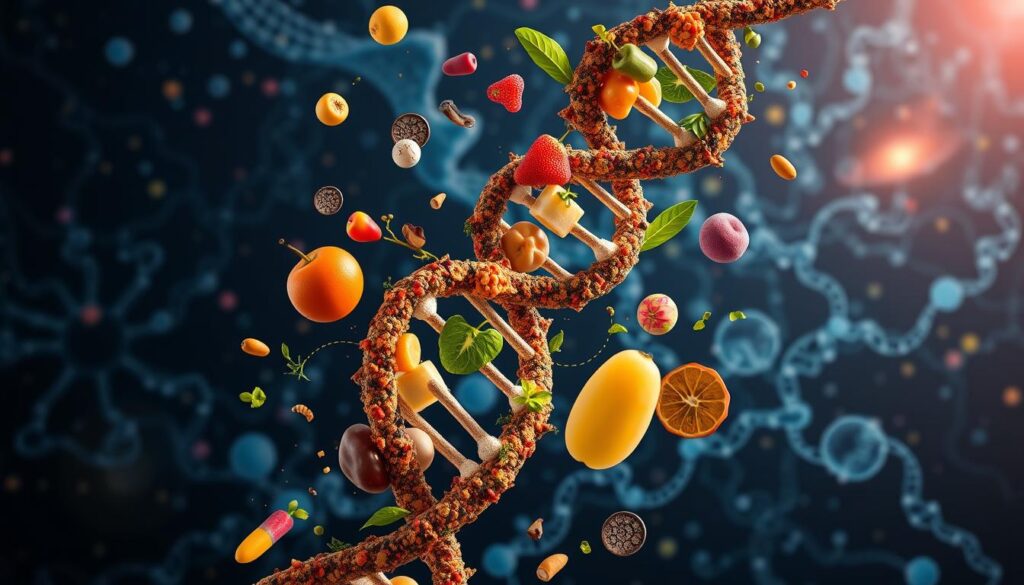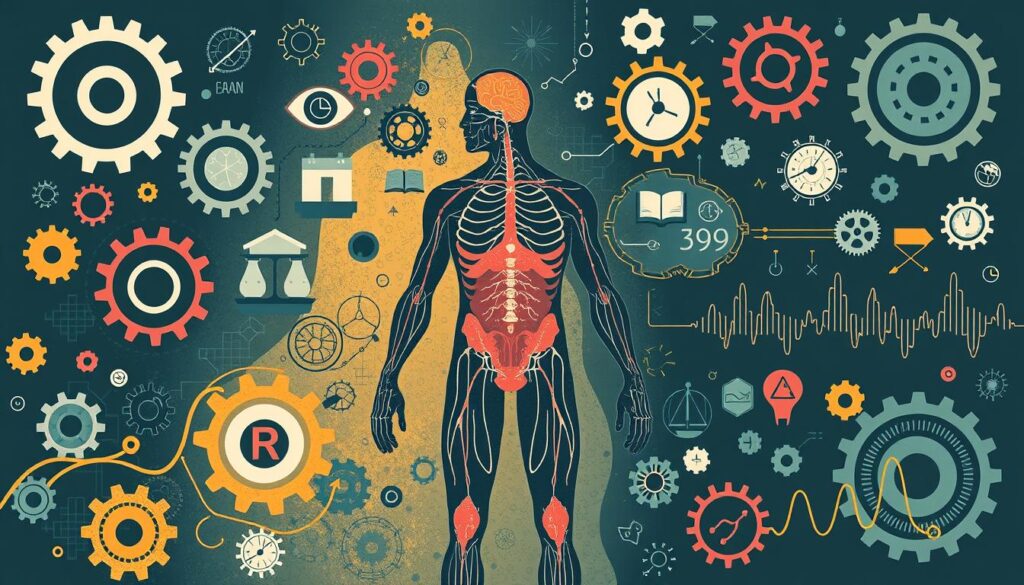Starting a weight loss journey can be tough. Your body wants to keep its current weight. This is because it’s trying to avoid starvation, a survival instinct from long ago.
Learning about how your body works can help. It lets you know what to expect and how to manage your weight better.
Key Takeaways
- Your body’s metabolism can slow down during weight loss, making it harder to keep the pounds off.
- Hormonal changes, such as increased ghrelin (the “hunger hormone”) and decreased leptin (the “fullness hormone”), can sabotage your weight loss efforts.
- Genetic factors and the body’s “set point” weight can influence your ability to lose and maintain weight.
- A comprehensive approach involving diet, exercise, and lifestyle changes is often required for sustainable weight loss.
- Working with healthcare professionals can help you navigate the complexities of weight management and achieve your goals.
Understanding Metabolic Adaptation and Weight Loss Resistance
Starting your weight loss journey? It’s key to know about metabolic adaptation. This is how your body fights big changes in how much you eat. It makes losing weight harder to keep off.
What is Metabolic Compensation?
When you eat fewer calories to lose weight, your body slows down. This is to save energy when food is scarce. So, you need fewer calories to live, and your metabolism goes down.
The Role of Energy Conservation
Your body wants to stay at a certain weight, called your set point. Losing weight is seen as a danger. So, it tries to save energy to get back to that weight. This makes losing more weight harder.
Impact on Daily Calorie Burn
With a slower metabolism, you burn fewer calories each day. Even if you exercise or eat less, it won’t work as well. This leads to a frustrating stop in weight loss.
| Metabolic Adaptation | Impact on Weight Loss |
|---|---|
| Reduced resting metabolic rate | Slower weight loss progress |
| Decreased energy expenditure | Higher risk of weight regain |
| Altered appetite-regulating hormones | Increased hunger and food cravings |
Knowing about metabolic adaptation helps beat weight loss resistance. By understanding this, you can manage your weight better.
How Your Body Fights Weight Loss: The Hormonal Battle
Starting a weight loss journey is tough. Your body fights hard to keep things the same. Hormones like leptin and ghrelin play big roles in this fight.
Leptin: The Satiety Hormone
Leptin comes from fat cells. It tells your brain you’re full. When you lose weight, leptin levels drop. This makes it hard to feel full and keep eating less.
Ghrelin: The Hunger Hormone
Ghrelin is made in your stomach. It makes you hungry. When you lose weight, ghrelin levels go up. This makes it hard to stop eating too much.
Hormonal Changes During Weight Loss
Weight loss affects more than just leptin and ghrelin. Hormones like insulin, cortisol, and estrogen also change. These changes can mess with your metabolism and energy. To keep a healthy weight, you need more than just eating less.

Understanding the hormonal changes in weight loss is key. By working with your body, you can beat the resistance and reach your goals.
The Brain’s Response to Weight Reduction
Starting a weight loss journey changes your brain a lot. It makes it hard to control how much you eat. Your brain’s food restraint and appetite regulation parts work less. This makes it tough to stop eating too much.
Also, your brain’s reward centers get more excited by tasty, high-calorie foods. This makes them more tempting.
Even after you lose weight, your brain can still make it hard to stay thin. The Habenula, a key brain area, helps control how you make choices about food. Changes in Ghrelin and Leptin hormones affect how much you eat and how much energy you use.
Ignoring hunger signals can lead to stress hormones that make you gain weight. To manage weight well, you need to look at the whole picture. This includes how your brain and hormones change when you lose weight.
| Key Insights | Impact on Weight Management |
|---|---|
| Reduced activity in brain regions responsible for food restraint | Increased difficulty in controlling portion sizes and resisting cravings |
| Heightened sensitivity of reward centers to high-calorie foods | Greater appeal and temptation of unhealthy, palatable foods |
| Fluctuations in hunger hormones Ghrelin and Leptin | Disruption of the body’s set point weight, leading to weight regain |
| Stress hormone triggers due to continuous hunger suppression | Increased likelihood of weight gain and metabolic slowdown |
To keep weight off for good, you need to know about the neurological changes and hormonal factors. Understanding these can help you find better ways to manage your weight for the long term.
Genetic Factors in Weight Management
Genetics play a big role in how likely you are to gain weight. Over 400 genes affect things like hunger, metabolism, and fat storage. Knowing your genetic predisposition is key to managing your weight.
Understanding Your Genetic Predisposition
Some people find it harder to lose weight because of their genes. This can affect how fast you burn calories and how your body handles weight loss. By knowing your genetic factors, you can make a plan that works for you.
How Genes Affect Metabolism
Some genes help control how fast you burn energy. If you have certain genes, you might burn calories slower. Knowing this can help you find better ways to lose weight.
The Role of Family History
Family history is important for weight management. If your family members have weight issues, you might too. Knowing your family history helps you take steps to manage your weight.
Even though genetics matter, you can still manage your weight. Work with doctors and make healthy lifestyle choices. This way, you can beat the challenges of your genes and lose weight for good.

“Genetics plays a significant role in determining an individual’s susceptibility to weight gain and obesity, but lifestyle factors and environmental influences also contribute to this complex issue.”
The Set Point Theory and Weight Management
Keeping a healthy weight is hard. The set point theory helps us understand why. It says your body wants to stay at a certain weight. This weight can change based on your genes, age, past weight loss, and hormones.
This theory also says it’s easier to stay at your set point. Your body fights hard to keep your weight the same. But, it’s hard to lose weight and keep it off because your set point rarely goes down.
Did you know about 20% of dieters can keep weight off? The National Weight Control Registry tracks people who lost 30 pounds and kept it off for a year. They found that these people do certain things like weigh themselves often and eat breakfast every day.
To lower your set point weight, experts suggest losing weight slowly. They say to aim for a 10% weight loss. Weight loss surgery can also help keep weight off for a long time.
Good weight management is about knowing your genetic factors. It’s also about eating well and staying active. Learning about the set point theory can help you manage your weight better.
“To reset the set point to a lower level, proponents recommend a gradual 10 percent step-down weight loss approach for persistent maintenance.”
Conclusion: Sustainable Approaches to Weight Loss
Getting to a healthy weight takes time and understanding your body. It’s better to aim for small, doable goals. This way, you can keep the weight off for good.
Eating more protein and doing both cardio and strength training helps. Also, working with doctors is key. Remember, losing weight is a journey that never ends.
Seeing weight loss as a long-term challenge helps set realistic goals. A whole-body health approach leads to lasting changes. It not only helps you lose weight but also makes you feel better overall.


A Life-Changing Experience with This Weight Loss Supplement (Nagano Tonic)
I’ve always struggled with finding a weight loss solution that actually works for me. Like many, I’ve tried numerous diets, exercise routines, and supplements over the years—some worked for a short time, but nothing ever gave me long-term results. That was until I decided to try the weight loss supplement I found : Link to the Supplement.
From the moment I started using it, I noticed a difference. Not only did I feel more energized, but my cravings also became more manageable. The best part? I started seeing results much quicker than I anticipated! Over the course of just a few weeks, I noticed a significant reduction in belly fat and overall weight loss that I hadn’t been able to achieve before.
What makes this supplement stand out from all the others I’ve tried is how it supports me in my daily routine without any jitters or energy crashes. I’m able to stay focused and motivated, which has made it easier to stay on track with my diet and exercise plan.
This product truly exceeded my expectations, and I feel more confident and healthier than ever before. If you’re struggling with your weight loss journey like I was, I highly recommend giving this supplement a try. It’s been a game-changer for me, and I’m sure it can work wonders for you too!
Contant Them on email .. tonicnagano50@gmail.com
I’ve tried so many weight loss products over the years, but nothing worked like this supplement! Since I started using it, I’ve noticed a big difference in my energy levels and appetite control. In just a few weeks, I’ve lost weight and feel so much better. It’s been easy to stick with, and the results speak for themselves. Highly recommend this to anyone looking to make a real change!
I was skeptical at first, but this supplement has truly made a difference in my weight loss journey. I’ve lost weight without feeling deprived or sluggish. My cravings are under control, and I feel more confident in my body. It’s easy to incorporate into my daily routine, and the results speak for themselves. I’m so glad I gave it a try!
Thanks David, i do use the link to make my purchase. you can get too here http://surl.li/iasppy
wasn’t sure what to expect, but this weight loss supplement has really impressed me! After just a few weeks of use, I’ve already dropped a few pounds and feel more motivated to stay active. It’s helped curb my cravings and boosted my energy throughout the day. I’m excited to keep going and see even better results. Definitely worth trying!
Reach them on tonicnagano50@gmail.com
I’ve tried so many weight loss products, but this one has been by far the most effective. In just a few weeks, I’ve noticed a visible difference in my body and energy levels. It’s helped me stay on track without the constant hunger pangs and cravings. I’m really happy with my progress and can’t wait to see where I’ll be in another month!
This Nagano Tonic has been amazing! In just a few weeks, I’ve lost weight, feel more energized, and my cravings are under control. Highly recommend it!
Thats the link to purchase http://surl.li/iasppy